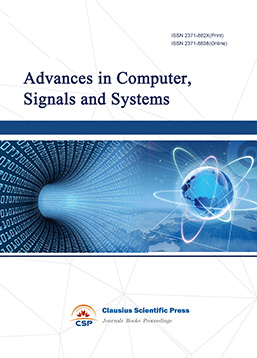Analysis of International Research Hotspots on the Application of Chatbots in the Field of Psychological Counseling—Text Mining Based on LDA Topic Model Analysis
DOI: 10.23977/jaip.2025.080211 | Downloads: 23 | Views: 1092
Author(s)
Jingze Li 1
Affiliation(s)
1 Institute of Higher Education, Lanzhou University, Lanzhou, Gansu, 730000, China
Corresponding Author
Jingze LiABSTRACT
The application of Chatbots in the field of psychological counseling has demonstrated numerous advantages. Based on the LDA topic model, this study conducted a text mining analysis of 564 relevant papers included in the Web of Science core collection, IEEE, and ScienceDirect peer-reviewed journal collections up to 2025. The findings reveal that international research on the application of Chatbots in psychological counseling primarily focuses on four areas: artificial intelligence and mental health interventions, psychotherapy techniques and clinical practice, accessibility and integration of mental health services with technology, and specific psychological disorders and interdisciplinary applications. Future research should continue to explore the deep integration of advanced technologies with mental health services, aiming to make cost-effective, personalized, and scientific psychological counseling accessible to every individual in need.
KEYWORDS
Chatbot; Psychological Counseling; LDA Topic ModelCITE THIS PAPER
Jingze Li, Analysis of International Research Hotspots on the Application of Chatbots in the Field of Psychological Counseling—Text Mining Based on LDA Topic Model Analysis. Journal of Artificial Intelligence Practice (2025) Vol. 8: 81-87. DOI: http://dx.doi.org/10.23977/jaip.2025.080211.
REFERENCES
[1] Liang Peng, Guo Ling, Li Qiuyu. Research on College Students' Mental Health Education from the Perspective of Generative Artificial Intelligence [J]. Journal of Foshan University of Science and Technology (Social Sciences Edition), 2024,42(04):96-100.
[2] Vaswani A, Shazeer N, Parmar N, Uszkoreit J, et al. Attention is all you need[J].Advances in Neural Information Processing Systems, 30
[3] Radford A, Wu J, Child R, Radford A, Wu J, Child R, et al. Language models are unsupervised multitask learners[EB/OL].[2019]. OpenAI Blog.
[4] Devlin J, Chang M W, Lee K, et al. BERT: pre-training of deep bidirectional transformers for language understanding[C]. Proceedings of the 2019 Conference of the North American Chapter of the Association for Computational Linguistics: Human Language Technologies,2019,1:4171-4186
[5] Fitzpatrick K K, Dark V, Guthrie D,et al. Delivering cognitive behavior therapy to young adults with symptoms of depression and anxiety using a fully automated conversational agent(Woebot):a randomized controlled trial[J]. JMIR Mental Health, 2017, 4(2):e16.
[6] Abd-Alrazaq A A, Alajlani M, Alalwan A A, Bewick B M, Gardner P, Househ M. An overview of the features of chatbots in mental health: A scoping review[J]. International Journal of Medical Informatics, 2019, 132: 103978.
[7] Xiaochong Lan, Yiming Cheng, Xiaochong Lan, Yiming Cheng, et al. Depression Detection on Social Media with Large Language Models[J]. ArXiv, abs,2024, 10750.
[8] Lucs G M, Gratch J, King A, Lucs G M, Gratch J, King A, et al. It's only a computer: virtual humans increase willingness to disclose[J]. Computers in Human Behavior, 2017, 37: 94-100.
[9] Nelson Chauhan, Samruddhi and Ashwini K Vaidya. Artificial Intelligence in Mental Health: Challenges and Opportunities[J]. International Journal of Nursing Education and Research, 2024.
[10] Han Yanan, Liu Jianwei, Luo Xionglin. Review of Probabilistic Topic Models [J]. Journal of Computer Science, 2021,44(6):1095-1139.
[11] Cao Shujin and Yue Wenyu. The Evolution of Academic Paper Research Topics in the School of Information Management, Wuhan University: Upholding Innovation-Nearly 60 Years [J]. Library Forum, 2020,40(11):86-97.
| Downloads: | 17428 |
|---|---|
| Visits: | 641191 |
Sponsors, Associates, and Links
-
Power Systems Computation

-
Internet of Things (IoT) and Engineering Applications

-
Computing, Performance and Communication Systems

-
Advances in Computer, Signals and Systems

-
Journal of Network Computing and Applications

-
Journal of Web Systems and Applications

-
Journal of Electrotechnology, Electrical Engineering and Management

-
Journal of Wireless Sensors and Sensor Networks

-
Journal of Image Processing Theory and Applications

-
Mobile Computing and Networking

-
Vehicle Power and Propulsion

-
Frontiers in Computer Vision and Pattern Recognition

-
Knowledge Discovery and Data Mining Letters

-
Big Data Analysis and Cloud Computing

-
Electrical Insulation and Dielectrics

-
Crypto and Information Security

-
Journal of Neural Information Processing

-
Collaborative and Social Computing

-
International Journal of Network and Communication Technology

-
File and Storage Technologies

-
Frontiers in Genetic and Evolutionary Computation

-
Optical Network Design and Modeling

-
Journal of Virtual Reality and Artificial Intelligence

-
Natural Language Processing and Speech Recognition

-
Journal of High-Voltage

-
Programming Languages and Operating Systems

-
Visual Communications and Image Processing

-
Journal of Systems Analysis and Integration

-
Knowledge Representation and Automated Reasoning

-
Review of Information Display Techniques

-
Data and Knowledge Engineering

-
Journal of Database Systems

-
Journal of Cluster and Grid Computing

-
Cloud and Service-Oriented Computing

-
Journal of Networking, Architecture and Storage

-
Journal of Software Engineering and Metrics

-
Visualization Techniques

-
Journal of Parallel and Distributed Processing

-
Journal of Modeling, Analysis and Simulation

-
Journal of Privacy, Trust and Security

-
Journal of Cognitive Informatics and Cognitive Computing

-
Lecture Notes on Wireless Networks and Communications

-
International Journal of Computer and Communications Security

-
Journal of Multimedia Techniques

-
Automation and Machine Learning

-
Computational Linguistics Letters

-
Journal of Computer Architecture and Design

-
Journal of Ubiquitous and Future Networks


 Download as PDF
Download as PDF